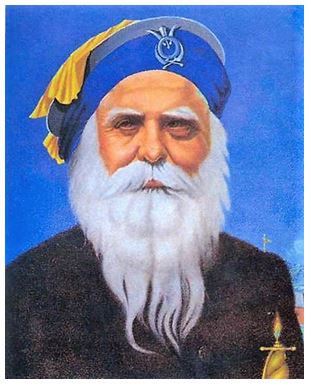KAUR SINGH NIHANG, AKALI

Akali Kaur Singh Nihang (28.2.1886 – 23.1.1953), born as Puran Singh, son of Bhai Mahan Singh, was born at village Chakkar (district Muzzafarabad, Kashmir). When he grew up he learnt Gurmukhi, Sanskrit and Persian. He studied a lot of religious, philosophic and medical literature. From his early days, he was interested in a carefree life. His parents tried to change his mood by getting him married but he was not made for this. The very day his marriage was solemnized, he disappeared. In 1906, he moved to Hazur Sahib and joined a Nihang Jatha. As a Nihang, he took a tour of all those places where there were Gurdwaras. He went to Assam, Bengal, Dravid-zone, Uttar Khand and Burma etc. Besides his missionary activities, he collected a lot of material about the Sikhs (including works like Sainapati’s Gur Sobha), which were, till then (in 1925), unknown to the scholars of the Sikh studies. He also found a portrait believed to be that of Guru Gobind Singh Sahib. Later, Akali Kaur Singh engaged himself in writing books. In 1907, he started work of his magnum opus Gur Shabad Ratan Parkash (line-wise index of the verses of Guru Granth Sahib) was completed in 1920 and published in 1923. It was a result of his labour of about 13 years. In 1928, he returned to Chakkar, his native village and established Guru Nanak Ashram, an educational institute for general as well as religious studies. He opened new schools in the surrounding villages too. Akali Kaur Singh wrote several books. His other works include: Tatkara Varan Bhai Gurdas (index of the verses of Bhai Gurdas), 1926, History of the Nihangs of Hazur Sahib, Hazuri Sathi (a book about Hazur Sahib), 1934. Besides, he wrote several articles for Kashmir Sikh Samachar and several other journals. Akali Kaur Singh was also a missionary. He initiated thousands of the Sikhs in various parts of the Indian sub-continent. Akali Kaur Singh was a very popular personality among the princes, the leaders and even among the common people. He was so well informed about the Sikh ideology that the scholars rarely contradicted his verdict about the issues of the Sikh philosophy. After 1947, at the time of the exodus of the Sikhs from the west Punjab, which had become a part of Pakistan, he worked very hard for the safety and the recovery of the Sikh women. Akali Kaur Singh never stayed at one place nor had he any property. He died at Rajinder Hospital Patiala, in 1953.
(Dr Harjinder Singh Dilgeer)